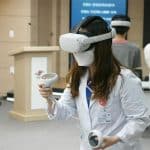April 4, 2021

Every fortnight, at 7:30pm GMT, a group of likeminded people meet virtually on Twitter to engage in a discussion on a set book which has been voted for using the hashtag #EdTechBookClub. The club, run by @Mrs_Educate, is about engaging and sharing resources and you can easily follow via @EdTechBookClub1. The focus is on enhancing their EdTech knowledge and sharing resources and input based on manageable sections of the book, normally around 4 chapters, so that we can keep learning while we support each other.
The latest read was Rewiring Education by Jason Towne and John D. Couch (Apple Inc.’s first Vice President of Education), chosen by the book club members using a Twitter poll. Not only did this book give an insight into how to rethink education using technology but it also gave an insightful background into how we ended up in the current situation. The standardised system is explored in the context of America but is poignant in many educational systems around the world.
The next book will be What Video Games Have to Teach us about Learning and Literacy by James Paul Gee and will start on 15th April 2021 at 7:30pm GMT. The initial session will be to read the first 3 chapters and we will meet fortnightly after this.
Who is Rewiring Education aimed at?
Although the focus is obviously on America and Apple there are many sections that are relevant to many educationalists beyond Apple devices. Couch shares his 50 plus years of experience and does so extremely well by giving anecdotal evidence and ideas from his meetings with Steven Jobs to speaking about real classrooms around the world who have embraced a way to rethink (or retire) education to focus on creativity. Anyone interested in thinking about using technology to enhance l and personalise will enjoy this book.
What’s the main focus of Rewiring Education?
The main focus is thinking about why education was set up to focus on standardising learning (and the potential corruption behind this) and if we need to think about breaking this now in order to rethink education. It looks into two studies from Apple (ACOT and ACOT 2) and how concepts such as Challenge Based Learning can unlock the potential of otherwise forgotten learners. The foci are very much around moving from schools who try and make learning a memory race to making them be maker spaces. There is great insight into Steve Jobs’ motivations and also some great anecdotes about real teachers such as Abdul Cohan (Bolton, UK) and Jodie Deinhammer (Dallas, USA) and how they have taken a stand to make a difference in their educational setting, and importantly how it’s worked. It’s definitely not about whether you should use technology or not but instead focuses on a balance and how to navigate technology in a world of digital natives.
How easy is it to read?
It’s very easy to read and uses stories and concepts that bring you in to the story. Often, we are taken back to a meeting or a chat with Jobs or told about particular pupils that we can all relate to teaching. Often these pupils are also now successful due to the way they have used technology and offer other examples of books to follow (such as The End of Average by Dr. Todd Rose). It is also available as an audio book which makes things even easier.
RECOMMENDED: https://global-edtech.com/category/community/
Rewiring Education – What’s the main takeaway?
That companies and non-educational influences have made a big impact on the way children learn in order to make a standard level of education. Some may agree with this and some may not but it has meant that some children in education have suffered. Now is the time to discuss how this can be changed and how technology can do this.
What did we discuss in the book club?
We discussed questions including –
- The book states the entire education system is broken. Is this our opportunity to replace it with something new? Why?
- Should reform be completed by digital natives?
- Do you think pupils with good memories have an unfair advantage in our educational system?
- Jobs said creativity is just connecting things. When you ask creative people how they did something, they feel a little guilty because they didn’t really do it, they just saw something. Do you agree?
- Chapter 10 says “Schools should be maker-spaces than memorisation races—in other words, relevant, creative, challenging, and collaborative”. How can we do this?
- In Chapter 16 it talks of change and quotes “So . . . what are you going to do about it?” What are you going to do for future learning to rewire education?
Favourite Part?
The stories about Steve Jobs and how he had a vision that he wasn’t going to give up on. Also, the experience that John Couch brings, this isn’t a one-off point of view but acquired from fifty years of experience and living and loving technology and education. I also love the examples of Challenge Based Learning and how we can utilise technology to make our pupils published authors and production managers at a young age, therefore utilising their creativity and potential.















0 Comments